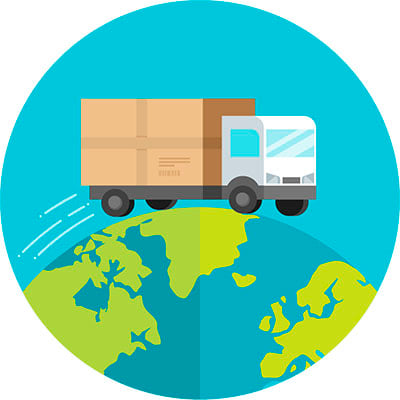As the e-commerce sector is rapidly growing, it is also impacting changes in the logistics sector. These changes include increasing the importance of same-day deliveries and introducing blockchain technologies to the supply chain.
In response to these advances, logistics managers are beginning to think based on how they can come up with systems that make their day-to-day activities more efficient. They are also on the verge of looking out for more trends that may revolutionize the future.

Evolving E-commerce Trends that will be Useful in Logistics
It is up to savvy logistics professionals to stay abreast with the trends in e-commerce that would help them revolutionize their industry. These e-commerce trends offer them the possibilities of tomorrow. They include the digitization of freight forwarding, predictive analysis, driverless trucks and the introduction of the blockchain in the supply chain as explained below.
Predictive Analytics
Most companies have analytics dashboards for organizing their metrics. However, this approach only offers them insights on the current and past trends. As predictive analytics is gaining popularity in the e-commerce sector, it allows store managers to use machine learning and technologies such as artificial intelligence to gain insights on future trends. Store managers who use this approach manage to make their business processes more efficient.
Predictive analytics also enables enterprises to know the type of consumers who are likely to make product orders. It enables them to determine how much these consumers can pay for a service or product. It also enhances business intelligence, improves supply chain management and reduces fraud. With this strategy, companies can generate lots of revenue on their sales.
Dynamic Routing
Routing solutions that use real-time data such as the current truck locations are increasingly gaining importance in companies that offer last-mile delivery services. These solutions also offer company managers real-time routing optimization and tracking contrary to the static fleet schedule that they used in the past. Clients of such companies are also expecting next-day or same-day delivery services. With dynamic routing, these organizations can know where their vehicles are in terms of location.
Blockchain Technology
The blockchain technology gained critical acclaim in e-commerce ever since online retailers began accepting crypto-currencies as a means of payment. This technology is also making its way in the supply chain. For instance, there are supply chain companies that are currently using it to track things like fresh foods. Its usage is becoming popular since it relies on a distributed ledger technology. With this technology, companies can store their transactions in a more immutable and secure way.
According to a recent survey by three companies (Korn Ferry, Infosys Consulting and Penske Logistics) on third-party logistics providers, shippers believe that the distributed ledger technology will be prevalent in supply chain activities. The survey also concluded that companies that deal with high-value and highly-perishable goods will soon realize the importance of relying on the blockchain technology.

Distributed Order Management (DOM) Systems Evolve
Distributed order management (DOM) systems are continuing to evolve in the logistics sector. This is because operations in this sector entail the flow of orders from processing to fulfillment. As the e-commerce industry grows rapidly, the DOM market is also growing. DOM systems enable organizations to record all the order management data across all applicable channels. The data captured entails order entry, sourcing process, fees processing and order fulfillment.
Digitized Freight Forwarding
Most logistics professionals are continuing to see the importance of digitizing their freight forwarding operations. Digitizing in this context refers to the process of automating services and systems for the customers to get real-time insights on the visibility, accurate quotes and rates of the shipments. Digitization also entails the process of introducing automation in freight handling activities to improve efficiencies.
The process of digitizing freight forwarding activities aims at fostering transparency in an organization. This means that shippers get to see how the entire activities are prevailing. Freight forwarders are beginning to add cloud-based access to these activities. This effort focuses on enabling them to be relevant in their industry and build customer trust.
Driverless Trucks
To curb the shortage of truck drivers that the logistics sector is currently witnessing, logistics professionals should use driverless trucks. It is time for these professionals to stop lagging behind in terms of handling clients’ request. They should not use the shortage in truck drivers as an excuse for neglecting clients’ ever-growing needs. The good thing about driverless trucks is that they are fast and easy to track.
The technology that driverless trucks rely on is continuing to progress rapidly. Several pilot tests are hitting the road every year to test how efficient the newly-introduced trucks are regarding delivering goods. Also, note that the use of autonomous vehicles is gaining traction across the globe. However, there are certain liability concerns and regulatory permissions that logistics professionals need to consider when using them to ferry goods across different borders.
Final Thoughts
Thanks to the growth of e-commerce, trends such as same day deliveries, autonomous trucks, DOM systems and predictive analytics are achieving recognition in the logistics sector. It is amazing how logistics professionals and companies are reacting to these advances. With this in mind, it is clear that the future of the logistics sector is bright. It is also worth noting that logistics organizations will focus on paying attention to and following the trends that are gaining traction in e-commerce.
If you’re interested in more posts about e-commerce and retail, check out our complete report detailing how technology is transforming the both brick-and-mortar and online stores.








